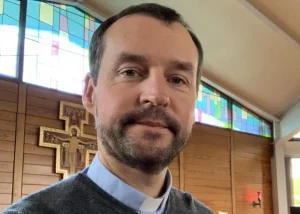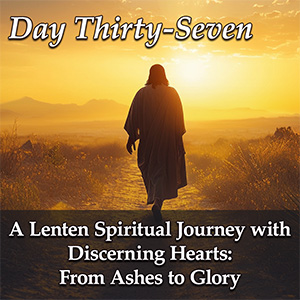Podcast: Play in new window | Download (Duration: 28:00 — 19.3MB) | Embed
Subscribe: Apple Podcasts | Spotify | Amazon Music | Android | Pandora | iHeartRadio | JioSaavn | Podchaser | Gaana | Podcast Index | Email | TuneIn | Deezer | Anghami | RSS | More
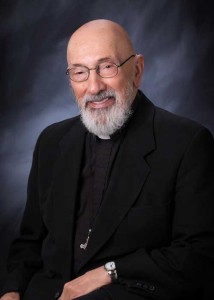
Palm Sunday: Uniting Our Pain With Christ – Building a Kingdom of Love with Msgr. John Esseff
Msgr. John Esseff passionately proclaims the resurrection of Jesus Christ not just as a past event but as a living reality. He invites all people—regardless of background or faith tradition—to hear the Good News that Jesus has conquered death and now lives, offering eternal life and peace. Merely being baptized or identifying as a Christian isn’t enough without a personal encounter with the risen Christ. Citing examples from his ministry, including a then-recent prison baptism, this encounter transforms lives. The period following Easter is not a conclusion, but a beginning—a mystagogical season leading to Pentecost, when the Holy Spirit empowers the faithful to witness like Peter, who only truly changed after receiving the Spirit.
Msgr. Esseff calls the next fifty days a sacred time of preparation for a deeper union with Christ and a bold mission to witness His resurrection to the world. He challenges us to reflect on their own transformation and purpose, asking how they will share Christ’s life in the world today. He affirms that Jesus continues to enter hearts and lives through baptism, the Word, and the sacraments, offering love, peace, and eternal life to all who receive Him.
Discerning Hearts Reflection Questions
- Have I truly encountered the risen Jesus in a personal and transformative way?
- What does my baptism mean to me today, and how is it shaping my daily life?
- How am I participating in the 50-day journey from Easter to Pentecost with openness to the Holy Spirit?
- Do I live as someone who believes in the resurrection, or merely observe it as a tradition?
- In what ways am I witnessing to Christ in my home, parish, and community?
- Have I allowed Jesus to enter the broken areas of my life with His healing and resurrection power?
- How often do I open Scripture to listen for Jesus and allow His Word to touch my heart?
- What is the Holy Spirit prompting me to do in response to the gift of the resurrection?
- Do I recognize my mission to help others encounter the living Jesus through love and service?
- How will I intentionally grow in union with Christ in these days leading to Pentecost?
At The Procession With Palms – Gospel MT 21:1-11
When Jesus and the disciples drew near Jerusalem
and came to Bethphage on the Mount of Olives,
Jesus sent two disciples, saying to them,
“Go into the village opposite you,
and immediately you will find an ass tethered,
and a colt with her.
Untie them and bring them here to me.
And if anyone should say anything to you, reply,
‘The master has need of them.’
Then he will send them at once.”
This happened so that what had been spoken through the prophet
might be fulfilled:
Say to daughter Zion,
“Behold, your king comes to you,
meek and riding on an ass,
and on a colt, the foal of a beast of burden.”
The disciples went and did as Jesus had ordered them.
They brought the ass and the colt and laid their cloaks over them,
and he sat upon them.
The very large crowd spread their cloaks on the road,
while others cut branches from the trees
and strewed them on the road.
The crowds preceding him and those following
kept crying out and saying:
“Hosanna to the Son of David;
blessed is the he who comes in the name of the Lord;
hosanna in the highest.”
And when he entered Jerusalem
the whole city was shaken and asked, “Who is this?”
And the crowds replied,
“This is Jesus the prophet, from Nazareth in Galilee.”
Msgr. John A. Esseff is a Roman Catholic priest in the Diocese of Scranton. Msgr. Esseff served a retreat director and confessor to St. Teresa of Calcutta. He continues to offer direction and retreats for the sisters of the missionaries of charity around the world. Msgr. Esseff encountered St. Padre Pio, who would become a spiritual father to him. He has lived in areas around the world, serving in the Pontifical missions, a Catholic organization established by Pope St. John Paul II to bring the Good News to the world especially to the poor. He continues to serve as a retreat leader and director to bishops, priests and sisters and seminarians and other religious leaders around the world.

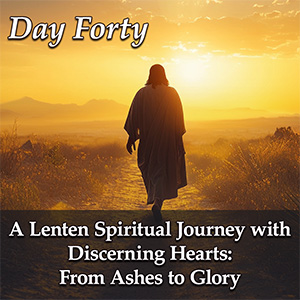
 Palm Sunday – A Time of Lectio Divina for the Discerning Heart Podcast
Palm Sunday – A Time of Lectio Divina for the Discerning Heart Podcast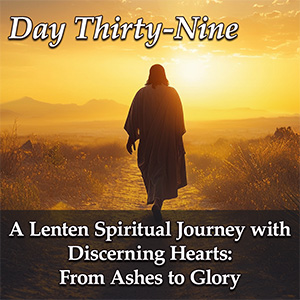
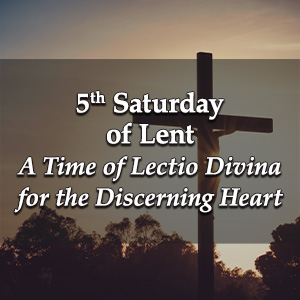 5th Saturday of Lent – A Time of Lectio Divina for the Discerning Heart Podcast
5th Saturday of Lent – A Time of Lectio Divina for the Discerning Heart Podcast
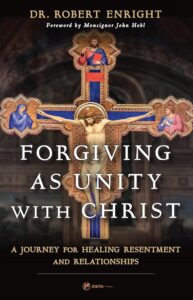 From the book’s description:
From the book’s description: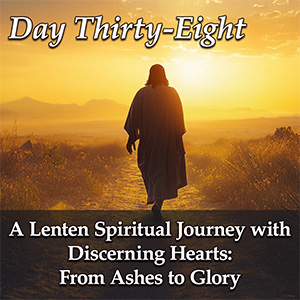
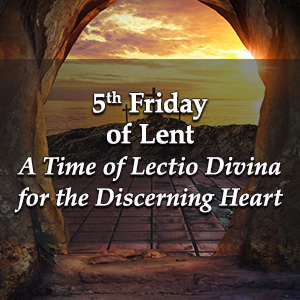 5th Friday of Lent – A Time of Lectio Divina for the Discerning Heart Podcast
5th Friday of Lent – A Time of Lectio Divina for the Discerning Heart Podcast